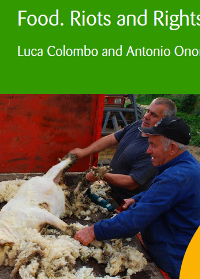Chinese agriculture today faces major environmental challenges, from unsustainably high applications of fertilisers and pesticides to widespread soil erosion, pollution, water scarcity and the loss of agricultural biodiversity. Coupled with the dramatic depopulation of rural areas and high-profile food safety scares, these challenges are prompting the emergence of a growing movement towards sustainable agriculture, witnessed by the rise in ecological farms, organic farmers’ markets in major cities, as well as increasing emphasis on sustainability in Chinese policies related to agriculture. But what impact is this movement having on these challenges and how can it best be supported?
Food. Riots and Rights
The last decade has seen global crises in finance, energy and the economy. But only the prolonged food crisis resulted in riots, reminding us of the historic link between the struggles for food and economic justice. This book, written by Antonio Onorati and Luca Colombo, focuses on the root causes and power games behind the global food crisis and what this means for reforming the global food system.
Measuring farmer’s agroecological resistance in the wake of Hurricane Mitch
This study, published in 2001 by IIED, is the outcome of a participatory action research carried out in cooperation with the Campesino a Campesino, a farmer-led sustainable agriculture movement in Latin America. It compares the sustainability of conventional to agroecological farms after Hurricane Mitch, covering 360 communities of smallholders from southern Nicaragua to eastern Guatemala.




